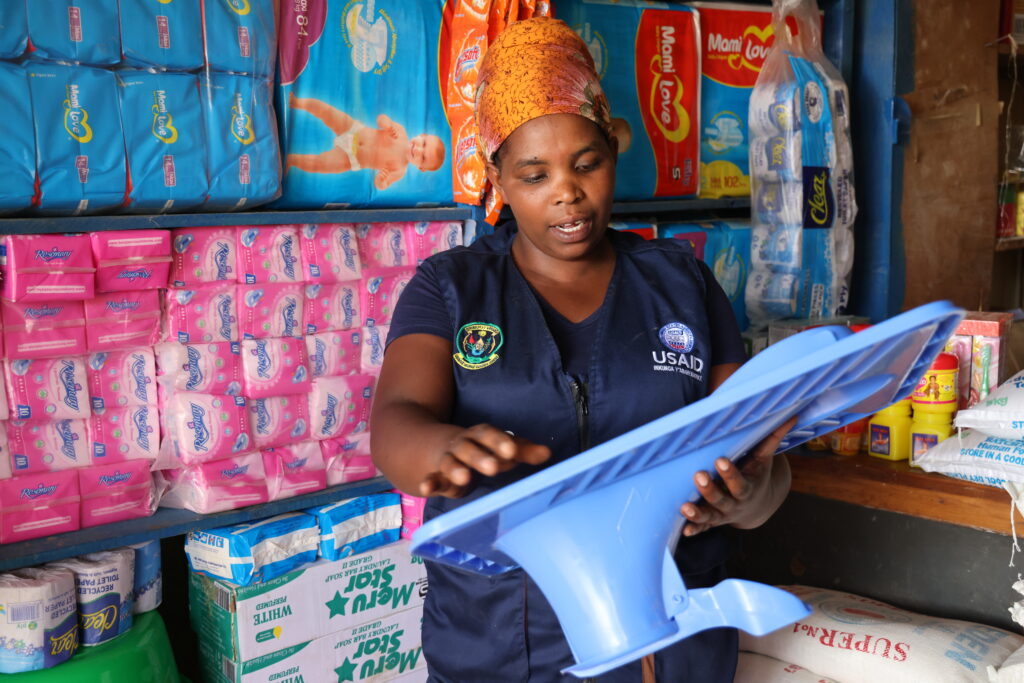Isoko y’Ubuzima is a 5-year USAID-funded project implemented from July 2021 through July 2026 by a consortium led by Water For People to improve water, sanitation, and hygiene (WASH) service delivery. Other members of the consortium are IRC, Vitens Evides International (VEI), CARE International, and African Evangelistic Enterprise (AEE).

The overall Isoko y’Ubuzima goal is to increase and sustain equitable access to, and use of safe drinking water and sanitation services which is critical to improved health
outcomes, improving the living standards of Rwandan citizens, and achieving Rwanda’s long-term development goals.
Under one of its strategic objectives, the Isoko y’Ubuzima project is working on creating a community with a transformed mindset about sanitation and hygiene. One of the major transformations the project is aiming for is personal/household ownership of the process of living sanitary lives with proper hygiene and safe, clean water.
The project is implementing activities that help families understand why they should prioritize the improvement of their sanitation while being intentional towards achieving this improvement.
The transformation is also based on abandoning the mindset of always expecting help to come from someone else, and the "sanitation is a woman’s only responsibility" mentality.
These changes have started happening! Now, Isoko y’Ubuzima is giving a shoutout to some of the women in the community that are boosting the sanitation change the
the project aims to achieve.
These women are influencing their husbands, families, and communities to accept investing in proper hygiene and sanitation facilities like installing handwashing facilities and/or building latrines.
Through market-based sanitation, Isoko y’Ubuzima is building the capacity of producers to fill any gaps in the supply chain of sanitation products to the community. As one of the approaches to bringing sanitation products closer to households, Isoko y’Ubuzima has established community showrooms.
The showrooms eliminate the geographical barrier to household access to essential sanitation and hygiene products. Most operators of these showrooms established so far are run by shopkeepers who add a dedicated corner of sanitation and hygiene products in the shop. In response to the demand created by the project’s social behavior change agents commonly known as Hygiene Focal Points and Village Agents (HFPs & VAs) in the community, these showrooms are meant to fill the demand. These HFPs and VAs often leverage community meetings "Inteko z’Abaturage", Village Saving and Loans Associations (VSLAs), and monthly
Umuganda days, for example, to raise awareness of the products available and or showcase new ones.
Sometimes they are joined by the showroom operators too! Speaking of these boosters of positive change, Rose Kanziga is the operator of a community showroom in Nyamagabe
District, Tare Sector. When she was trained on hygiene and sanitation behavior change communication by Isoko y’Ubuzima and encouraged to add a sanitation corner to her business, she gladly took the advice.
Rose easily started initiating talks about sanitation improvement with her clients. While challenging the norm about sanitation needs being a women’s responsibility, Rose influenced many men in her community to buy SATO pans and set goals of improving their household latrines. She always challenges peers to adopt improved standards of hygiene in their lives.
Similarly, Rose Uwineza is the operator of a showroom in Kayonza District, Mukarange Sector, Kayonza Cell, and Kayonza Centre Village. Her showroom is in the city center, and this location is strategic for being accessible to everyone coming to the main market or seeking other services in this small town. Rose is an entrepreneur at heart, and her business growth and bookkeeping are impressive.
Rose sees the potential of the showroom as a business and the impact it has on the community primarily by bringing sanitation products nearby and changing people’s mindset on spending on hygiene and sanitation products. She hopes to add more products and partner with the sales agents and the HFPs in community mobilization. To conclude this shoutout to the changemakers, here is another example of a woman who was able to help her family to prioritize their sanitation needs.
Nyirahabimana Cesarie is the wife of Jean de Dieu Ayirwanda. They live in Ngoma District, Mutenderi Sector, Mutenderi Cell, and Akarimba Village. Cesarie is part of the advisory board of their village. Therefore, she is one of the early adopters of key messages of community development and often aims to be an example to her community.
Cesarie contributes to her family’s development through her husband. In the past, her husband did not think "improved sanitation" needs should be a priority for their family.
For him having a latrine-even if it is not close to the house in any condition is enough.
However, Cesarie learned from the Urumuri group, her VSLA, the value of an improved latrine and hygiene to her family’s health and safety. She started to share these new insights with her husband. After multiple discussions with her husband and hearing the same sanitation behavior change messages on the radio, he realized it was time for his family to act. As a result, Cesarie and her family built a new roofed latrine with an all-covered hygienic slab and a handwashing tippy tap in their home.
These women and others like them leading changes in their homes and community are the unsung leaders. They drive the impact that Isoko y’Ubuzima aims to see and their efforts do not go unnoticed. These cheerleaders are key to sustainable impact in the community, and the more empowered women we have, the more households improve their sanitation and lifestyle.

